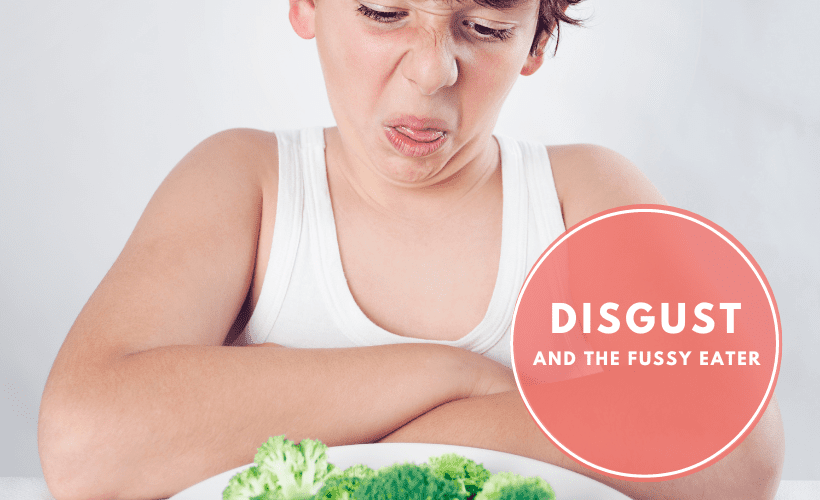
“Yucky food, Mum!” screams your fussy eater as you bring a dish to the table. It seems such an exaggeration, yet the tone your child uses concerns you! Is that really how she feels? Why is your child disgusted with food? Let us take a minute to consider how we all have experienced disgust at some point – that feeling when we see or smell something that makes our stomachs churn. What exactly is disgust? And how does it relate to food? In this blog post, we will explore these questions and discuss how to support your fussy eater as they show signs of disgust. So read on to learn more about disgust and the fussy eater.
Disgust is an emotion often expressed as Yucky Food
Screaming “yucky food” is very much how your child expresses disgust. Disgust is a natural emotion that we experience when we encounter something that is unpleasant, dangerous, or dirty. It is an evolutionary adaptation that helps protect us from harmful substances. In other words, it is our body’s way of protecting us from things that could make us sick. Disgust is not just limited to physical objects; it can also be triggered by thoughts[1], memories, and even certain tastes and smells.
“Disgust is probably the most intuitive of all the emotions,” says Paul Rozin, a professor of psychology at the University of Pennsylvania. “It is the emotion of revulsion.”
It is important to note not all disgust is bad. For example, the sight and smell of rotting food can cause disgust and lead us to avoid eating it. This is a good thing, as rotten food can make us sick.
Yucky Food – How Disgust Relates to Food
Given that disgust is often triggered by the fear of contamination, it is not surprising that food often plays a role in our experience of disgust. In fact, studies have shown that people are more likely to feel disgusted by food than by any other type of object or situation. There are several reasons for this:
First, food is something that we put into our bodies, which makes us particularly vulnerable to contamination. Are you someone who can eat anything anywhere? I cannot. When travelling, I cannot buy food if I feel disgust. At home, I do not feel comfortable with people who double dip in the food we are sharing, I would rather avoid eating. Since childhood I have struggled to share a bottle of water with my parents, siblings, and friends. The thought disgusts me. I would rather not drink. However, I have no difficulty sharing a drink with my husband or children. Disgust is my way of expressing a deep-rooted fear of contamination.
Finally, our sense of taste is intricately linked to our sense of smell, which means that bad smelling yucky food can also trigger a powerful sense of revulsion. Do smells stop you from eating specific foods? Do you struggle with smells at the market or the butcher?
Food you offer your child is very safe, yet their reaction of disgust to a mixed dish, as irrational as it is, is just an emotion. A mixed dish texture may trigger unease so may a few peas in rice. “There are lots of nutritious things people will not eat because they find them disgusting,” said Rozin. “Take Brussels sprouts—they are full of vitamins and antioxidants, but many people find them repulsive.”
So why do our brains trick us into thinking that regular foods are yucky food? “From an evolutionary perspective, it makes sense for people to be risk-averse when it comes to food because eating the wrong thing can make you sick—or even kill you, says Rozin[2].” Of course, most of our food is very safe, it could be that our brains have not yet caught up with the evolution of the food we have access to. As our food supply has become more reliable and diverse, our disgust response has become less useful.”
Culture and Disgust
Our disgust towards certain foods is often learned. In our family we eat snails. I exposed my children to this French delicacy incredibly early on. However, we would struggle to eat crickets. I have met autistic children who despite feeding difficulties eat dhal, borscht, or shrimps, thanks to the family food culture.
Disgust also plays a crucial role in food choices when culture forbids certain foods. Indeed, in kosher and halal diets, there are strict rules about what can and cannot be eaten. These rules are based on the belief that certain foods are impure and should be avoided.
Disgust, Anxiety and Avoidance
In some cases, disgust will trigger such anxiety that it may lead to avoidance[1] behaviour. This can be problematic, especially when it comes to food, because avoiding the food brings relief and reinforces the need for avoidance. Avoiding the food altogether is detrimental to the child’s long-term ability to eat it. Children may develop food aversions. When we talk to adults who experienced being forced to eat a food, they tell us that they still find it disgusting and have not learned to eat it. They may remember traumatic experiences such as gagging, or vomiting, when trying to eat the yucky food to obey their parent.
So what can parents do to help their children navigate the world of disgust?
Supporting your fussy eater to deal with yucky food
- Do not force your child
Sometimes parents will convince their child to eat the yucky food. Imagine this, your obedient child wants to appease you. She finally tackles that brussels sprout. She hardly chews, takes a swallow and before you can rejoice that she took a bite, she vomits. This was never about reasoning or convincing her. She tried to listen but in the end her body said no.
- Do not trick your child
While it is OK to make an exceptionally smooth tomato sauce with every veggie under the sun, hiding bits and pieces in a dish, or misleading your child about a yucky food, it will backfire. Sensitive children will know that you added mushrooms to the pasta Bolognese or changed the yoghurt brand. Trust is your only currency in feeding.
- Avoid being too reactive
When children get dirty or messy, it is best to avoid reacting too quickly, this will reinforce a sense of discomfort or danger. Instead, when your child shows discomfort, say what you notice, “it’s sticky isn’t it?” Then help your child work out what to do, ‘you can use the tea towel, here’, ‘you could wash your hands at the kitchen sink’.
- Model healthy behaviour
Children learn by observing the adults around them, so it is important to model healthy behaviour yourself. If you are disgusted by certain foods, your child is likely to notice this and may start avoiding them too. The first time I served oysters to my children, my husband ruined the experience by saying aloud how disgusting he thinks they were. He learned never to do that again!
- Ask your child to be polite
When your child says, “yucky food mum”, but the food is perfectly safe, say something along the line of, “this is a bit of a surprising food for you, isn’t it? Can you be polite about it though? If your child does not have to consume the yucky food, she can learn to be open-minded and respectful of others’ eating preferences.
- Let your child work it out
For example, when your child is disturbed by smells, help her work out what to do, move away, ventilate, use a preferred scent? Smells are less invasive when they slowly rise, think about regular cooking as opposed to microwaving. Smells can linger and become less noticeable. Smells are ambiguous, for example, does parmesan smell like vomit or pineapple?
As you parent your child to deal effectively with disgust, just remember it is an emotion. If your child feels safe, they will deal with disgust in a more mature way. Ruling out “yucky food” is obviously not the way, as it may reinforce avoidance. Presenting food without pressure builds trust, hiding food can raise anxiety and affect trust. Did you know that on instagram, our #sensorykitchen talks about what’s wrong with food? Follow us for more understanding of how to support your fussy eater.


